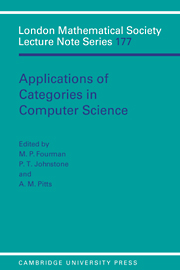 Applications of Categories in Computer Science
Applications of Categories in Computer Science Published online by Cambridge University Press: 24 September 2009
Abstract
We explore some foundational issues in the development of a theory of intensional semantics, in which program denotations may convey information about computation strategy in addition to the usual extensional information. Beginning with an “extensional” category C, whose morphisms we can think of as functions of some kind, we model a notion of computation using a comonad with certain extra structure and we regard the Kleisli category of the comonad as an intensional category. An intensional morphism, or algorithm, can be thought of as a function from computations to values, or as a function from values to values equipped with a computation strategy. Under certain rather general assumptions the underlying category C can be recovered from the Kleisli category by taking a quotient, derived from a congruence relation that we call extensional equivalence. We then focus on the case where the underlying category is cartesian closed. Under further assumptions the Kleisli category satisfies a weak form of cartesian closure: application morphisms exist, currying and uncurrying of morphisms make sense, and the diagram for exponentiation commutes up to extensional equivalence. When the underlying category is an ordered category we identify conditions under which the exponentiation diagram commutes up to an inequality. We illustrate these ideas and results by introducing some notions of computation on domains and by discussing the properties of the corresponding categories of algorithms on domains.
Introduction
Most existing denotational semantic treatments of programming languages are extensional, in that they abstract away from computational details and ascribe essentially extensional meanings to programs.
To save this book to your Kindle, first ensure [email protected] is added to your Approved Personal Document E-mail List under your Personal Document Settings on the Manage Your Content and Devices page of your Amazon account. Then enter the ‘name’ part of your Kindle email address below. Find out more about saving to your Kindle.
Note you can select to save to either the @free.kindle.com or @kindle.com variations. ‘@free.kindle.com’ emails are free but can only be saved to your device when it is connected to wi-fi. ‘@kindle.com’ emails can be delivered even when you are not connected to wi-fi, but note that service fees apply.
Find out more about the Kindle Personal Document Service.
To save content items to your account, please confirm that you agree to abide by our usage policies. If this is the first time you use this feature, you will be asked to authorise Cambridge Core to connect with your account. Find out more about saving content to Dropbox.
To save content items to your account, please confirm that you agree to abide by our usage policies. If this is the first time you use this feature, you will be asked to authorise Cambridge Core to connect with your account. Find out more about saving content to Google Drive.